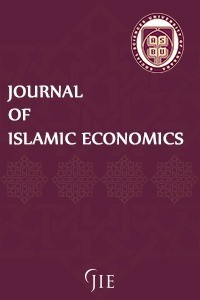The Islamic Financial Industry: What Is Its Role in the Moralization of Financial Markets?
Anahtar Kelimeler:
Marché Financier, Industrie Financière Islamique, Ethique
The Islamic Financial Industry: What Is Its Role in the Moralization of Financial Markets?
This article tries to show the importance of the ethics of the Islamic financial industry in the financial markets to see how it can contribute to making the practices of Western Classical financial markets more ethical.
The Islamic financial industry has diversified to reach several segments of modern finance. It offers a series of financial reforms and techniques at the heart of the classical economic system.
Through the principles on which its institutional system is based, which consider the ethical and social aspects of the business world, this industry can cope with the phenomena of crises and fluctuations, preventing monopolies, fraud, and deception and promoting rational behavior against speculation. This reality makes financial markets a factor of stability, a development tool, and a means of accumulating savings and financing projects.
Indeed, if the so-called ethical Islamic financial industry certainly makes it possible to introduce an important ethical dimension into the moralization of the financial markets, it is not definitely free from faults and limits.
Keywords:
Financial Markets, islamic financial industry, Ethics Marché Financier, Industrie Financière Islamique, Ethique,
___
- Belabes, A. (2010). Épistémologie des principes de la finance islamique, Les Cahiers de Finance islamique, École de Management Strasbourg, Université de Strasbourg, No. 02, p.05.
- Benhalima, A. A. (2018). Finance éthique et moralisation de l’activité financière cas : la Finance islamique, thèse présentée pour l’obtention du grade de docteur en sciences, Spécialité : Sciences économiques, Option : Gestion bancaire, Université Djilali Liabes Sidi-Bel-Abbes, p.66.
- Arjaliès, D. L. (2011). Qu’est-ce que l’Investissement Socialement Responsable ? Western University, Business (Richard Ivey School of Business), Business Publications, No.11, p.02.
- El Khamlichi, A. (2012). Éthique et performance : le cas des indices boursiers et des fonds d’investissement en finance islamique, thèse en cotutelle pour l’obtention du titre de Docteur ès Sciences de Gestion, Université d‘Auvergne, École Universitaire de Management de Clermont-Ferrand, Centre de Recherche Clermontois en Gestion et Management.
- Haddad, A. (2015). « Finance islamique : quand l’éthique s’invite dans la finance », Avestone, Bankobserver, le blog banque des consultants Wavestone, https://www.bankobserver-wavestone.com/finance-islamique-volet-1-quand-lethique-sinvite-dans-la-finance/.
- ICD-Refinitiv, (2019). Islamic Finance Development Report 2019. Innal, F. (2018). La finance islamique une industrie naissante et moderne ? Éditions universitaires européennes, p.07.
- Janine, B. A. G. (1981). Dictionnaire économique et social, Hatier, Paris, p. 237. Guermas-Sayegh, L. (2011). « La religion dans les affaires : la finance islamique », www.fondapol.org.
- Fadel, M. (2017). Finance & Éthique islamique, CILE / Tawhid, CILE, pp.28-30.
- Mzid, W. (2011). La Finance islamique : Principes fondamentaux et apports potentiels dans le financement de la croissance et du développement. Economic Agendas of Islamic Actors, PAPERSIEMed.
- Obaidullah, M. (2007). Teaching Corporate Finance: From an Islamic Perspective. Kingdom of Saudi Arabia, Ministry of Higher Education, King Abdulaziz University, Islamic Economics Research Centre, p.31.
- S&P. Global Ratings (2022). Islamic finance outlook, 2022 edition, p.10.
- Trari, M. H. (2012). Des limites de la finance conventionnelle à l’émergence de la finance alternative, doctorat d’État en sciences économiques, université d’Oran, p.220.
- Başlangıç: 2021
- Yayıncı: Ankara Sosyal Bilimler Üniversitesi
Sayıdaki Diğer Makaleler
The Islamic Financial Industry: What Is Its Role in the Moralization of Financial Markets?
Muzara’ah-Based Crowdfunding for Financing Small Farmers in Mali
The Islamic Economic System From a Normative Point of View Design Based on Questionnaire Tool
Ghassan el-Şeyh, İslam Hukukunda Finansal Kiralama, Dimaşk: Daru’l-Kalem Yayınevi, 1.Baskı / 2010
The Impact of Covid-19 on Microfinance Institutions in Somalia
